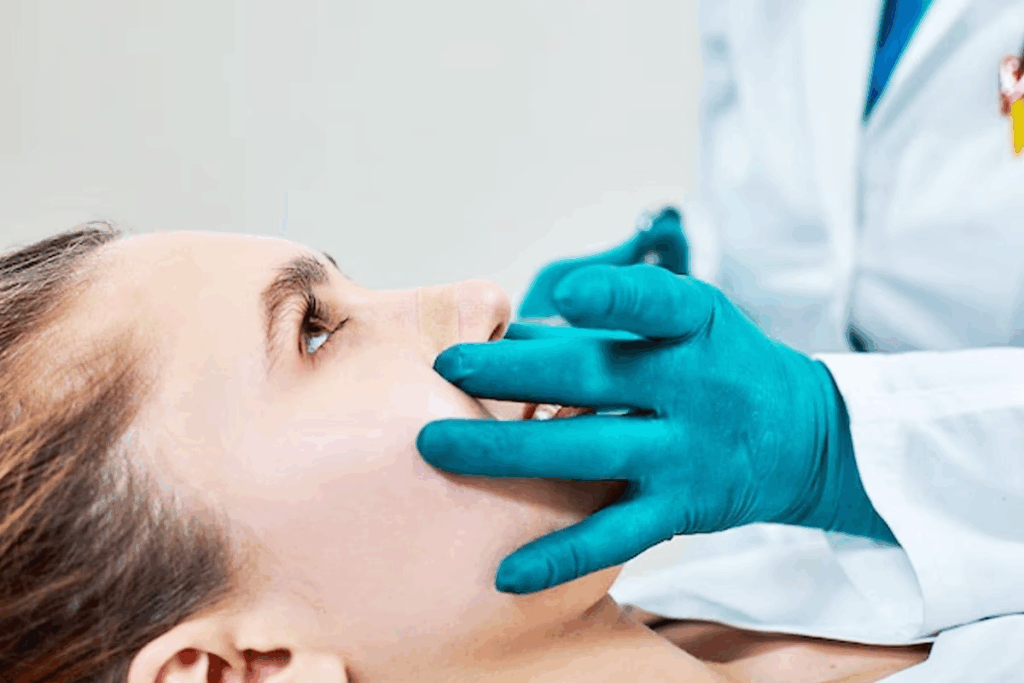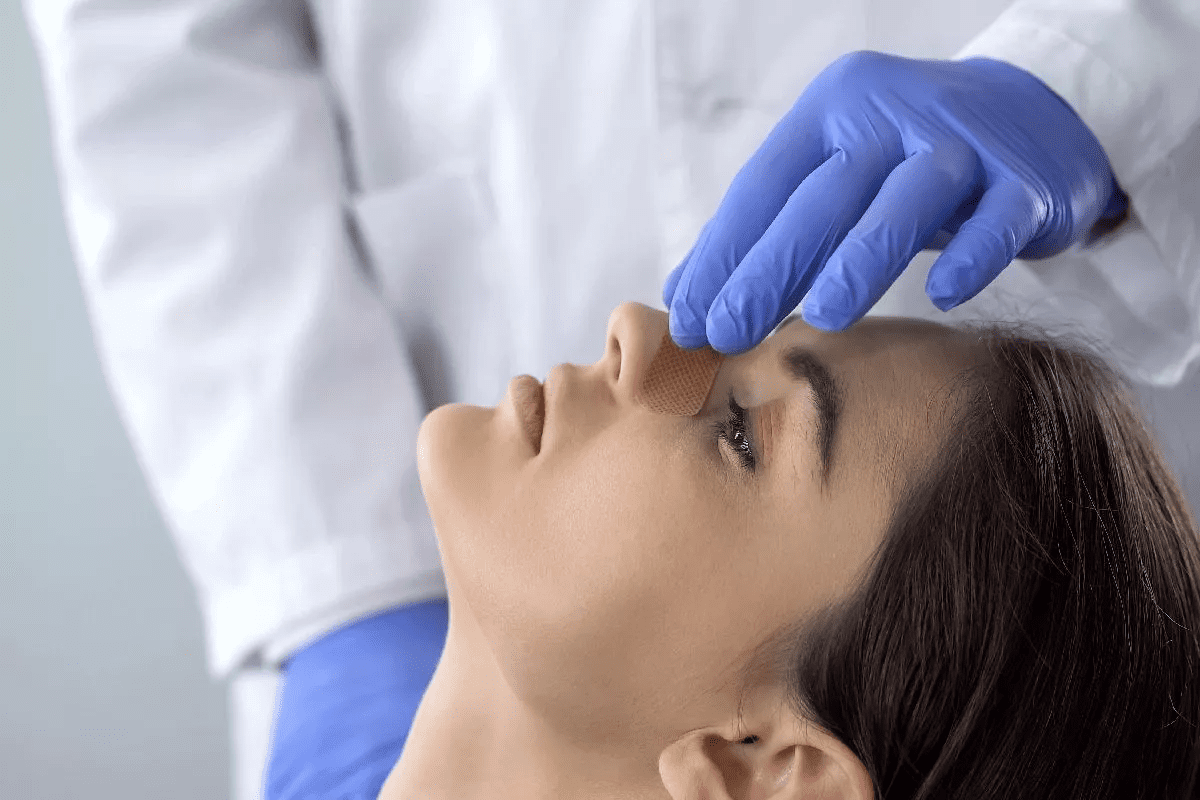
A deviated nasal septum is a common issue. It affects about 80 percent of people. This problem occurs when the cartilage and bone in the nose are not straight. It can cause breathing problems, congestion, and nosebleeds, making life harder.Deviated nasal septum medication and home remedies to manage symptoms like congestion and inflammation before surgery.
Some people are born with it, while others get it from a nose injury. Knowing how to deal with its symptoms is key. We will look at different treatments, including medications and remedies to ease symptoms of a deviated septum.
Key Takeaways
- Understanding the causes and symptoms of a deviated nasal septum.
- Exploring available treatment options for managing symptoms.
- Learning about medications that can help alleviate congestion and breathing difficulties.
- Discovering remedies that can provide relief from a deviated septum.
- Managing the condition to improve quality of life.
Understanding Deviated Nasal Septum

The nasal septum is a thin wall of cartilage and bone. It’s key to our breathing. When it’s deviated, it can cause health problems. Knowing what a deviated septum is is important for managing it.
What Is a Deviated Septum?
A deviated septum means the cartilage and bone in your nose are crooked. This can make breathing hard and lead to sinus infections. Sometimes, it doesn’t show symptoms, but if it does, you should see a doctor.
Most people don’t think about the tissue between their nostrils, the nasal septum. Even a slight deviation usually doesn’t cause problems. But if you’re having trouble breathing or getting nosebleeds, tell your doctor.
Prevalence and Common Causes
Many things can cause a deviated septum, like genetics, injury, or developmental issues. It’s common and affects people all over the world. Knowing why it happens helps find the right treatment, like deviated septum nasal spray.
Some people are born with it, while others get it from an injury. Doctors can diagnose it with an exam and tests.
Symptoms and Complications
Symptoms of a deviated septum vary but often include stuffy nose, nosebleeds, and sinus infections. If not treated, it can cause serious breathing problems. Knowing the symptoms and risks is key to managing it.
Doctors aim to ease symptoms, not fix the septum. There are many treatments, like cures for deviated septum and deviated septum remedies. They can help make life better.
Medical Approaches to Deviated Septum Management

A deviated septum can be tough to deal with. But, there are medical ways to make it easier. The main goal is to lessen symptoms and make life better.
Symptom Management vs. Structural Correction
Medical treatments for a deviated septum mainly aim to ease symptoms. They don’t always fix the septum itself. Medications for deviated septum can help by reducing stuffiness and swelling.
Decongestants, for example, shrink blood vessels in the nose. This helps with swelling and stuffiness. But, they should be used carefully to avoid getting too used to them. If allergies or sinus issues make things worse, doctors might suggest deviated nasal septum medication like antihistamines or nasal sprays.
When Medications Can Help
Medicines are key in managing deviated septum symptoms. Decongestants, for instance, help keep airways open by reducing swelling. Antihistamines are great if allergies make symptoms worse. Nasal corticosteroid sprays also help by cutting down on swelling and stuffiness.
Setting Realistic Expectations
It’s important for patients to know what to expect from treatment. While medications for deviated septum can help a lot, they might not get rid of the problem completely. Knowing what treatments can and can’t do is important for managing the condition well.
Working with healthcare providers can help create a treatment plan that fits your needs. This way, you can improve your life quality.
Deviated Nasal Septum Medication Options
For those with a deviated septum, knowing about different medications is key. These options can help manage symptoms and improve life quality.
Over-the-Counter vs. Prescription Treatments
There are both OTC and prescription meds for a deviated nasal septum. OTC decongestants are easy to find and offer quick relief. Decongestants like pseudoephedrine or oxymetazoline nasal spray help by reducing swollen tissues, making breathing easier.
For more serious cases, prescription meds might be needed. Corticosteroid nasal sprays, like Flonase, are often prescribed. They have strong anti-inflammatory effects.
- Corticosteroid nasal sprays: Reduce inflammation and swelling, improving airflow.
- Decongestants: Provide short-term relief by shrinking nasal tissues.
Duration of Treatment
The length of treatment depends on the medication and symptom severity. Decongestants are for short use (up to 3-5 days) to avoid rebound congestion. Corticosteroid sprays, on the other hand, can be used longer, often taking one to three weeks to show results.
Potential Side Effects
It’s important to know the possible side effects of these medications. Decongestants can cause sleep issues, increased heart rate, and anxiety. Corticosteroid sprays might lead to dryness, irritation, or, rarely, nosebleeds.
- Watch for side effects and adjust treatment if needed.
- Talk to a healthcare provider if side effects get worse or don’t go away.
Knowing about the different medications, their benefits, and side effects helps those with a deviated septum. They can make better choices with their healthcare provider’s help, finding the best treatment.
Decongestants for Symptom Relief
Decongestants can help a lot if you have a deviated septum. They shrink swollen nasal tissues, giving quick relief. But, it’s important to use them carefully to avoid getting worse congestion.
How Decongestants Work
Decongestants are a good choice for deviated septum. They reduce swelling in the nasal passages, helping you breathe better. Decongestants for deviated septum come in pills and sprays.
Oral vs. Nasal Decongestants
There are two main types of decongestants: oral and nasal. Oral ones are taken by mouth and work all over. Nasal sprays, like nasal sprays for deviated septum, give fast relief but should be used carefully to avoid getting too used to them.
Risks of Overuse and Rebound Congestion
Decongestants can really help, but using too much can cause problems. Rebound congestion happens when you need the decongestant to breathe. It’s key to use them as directed to avoid this issue.
Corticosteroid Nasal Sprays for Inflammation
Reducing nasal inflammation is key to managing a deviated septum. Corticosteroid nasal sprays are at the forefront of this treatment. These sprays decrease swelling in the nasal passages. This improves airflow and reduces symptoms like congestion and postnasal drip.
Popular Brands
Several corticosteroid nasal sprays are available over-the-counter and by prescription. Brands like Flonase, Rhinocort, and Nasacort are popular. Flonase is known for its effectiveness in reducing nasal inflammation. It’s often recommended for patients with allergic rhinitis, which can worsen deviated septum symptoms.
“Corticosteroid nasal sprays have revolutionized the treatment of nasal inflammation,” says Dr. Smith, an ENT specialist. “They offer a non-invasive solution with minimal side effects when used correctly.”
Proper Application Techniques
To maximize the effectiveness of corticosteroid nasal sprays, proper application is key. Patients should gently blow their nose before use. Then, tilt their head slightly forward and spray the medication into the nostril, aiming towards the outer wall of the nose. It’s important to avoid spraying towards the nasal septum to prevent irritation.
- Shake the bottle gently before each use.
- Prime the pump if it’s the first time you’re using it or if it hasn’t been used in a while.
- Use the spray in one nostril, then the other, as directed.
- Clean the nozzle regularly to prevent clogging.
Timeline for Effectiveness
The effectiveness of corticosteroid nasal sprays can vary. Some people may feel relief in a few days, while others may need weeks. Consistency is key, as these sprays are most effective when used regularly as directed.
Nasal irrigation using saline solutions can complement the use of corticosteroid nasal sprays. This combination cleanses nasal passages and removes excess mucus. It provides additional relief from stuffiness and postnasal drip.
By understanding how to use corticosteroid nasal sprays effectively, individuals can maximize their benefits. These sprays offer a valuable treatment option for deviated septum and other nasal issues.
Antihistamines for Allergy-Related Symptoms
For those with a deviated septum, allergies can make symptoms worse. Antihistamines are key in treating these symptoms. They help with nasal congestion, sneezing, and runny nose, which are common issues.
When Allergies Worsen Deviated Septum Symptoms
Allergies can make a deviated septum worse by adding to the nasal blockage. This can cause more discomfort, like increased congestion, itchiness, and sneezing. Antihistamines are important in managing these symptoms.
Using a saline spray or neti pot can help remove allergens and keep the nose moist. If allergies make your nasal symptoms worse, antihistamines can block allergic reactions. They also reduce nasal drainage and inflammation.
Non-Drowsy vs. Sedating Options
Antihistamines are either non-drowsy or sedating. Non-drowsy options like loratadine (Claritin) and fexofenadine (Allegra) are good for daytime use. They are less likely to make you sleepy. Sedating antihistamines, such as diphenhydramine (Benadryl), are better for nighttime use but can make you drowsy during the day.
- Non-drowsy antihistamines: Suitable for daytime use, less likely to cause drowsiness.
- Sedating antihistamines: Can be used at night to aid sleep, but may cause daytime drowsiness.
Combining Antihistamines with Other Treatments
Antihistamines can be used with other treatments for better relief. For example, using them with nasal corticosteroid sprays can reduce inflammation and allergic reactions. Saline nasal sprays or irrigation can also be used with antihistamines to keep the nose clear.
It’s important to talk to a healthcare provider to find the right combination of treatments. They can help you choose the best options for your condition and create a treatment plan that works for you.
Nasal Irrigation and Home Remedies
Nasal irrigation and home remedies can help with deviated septum symptoms. They work alongside medical treatments to ease congestion and improve breathing.
Using Neti Pots with a Deviated Septum
Neti pots are great for nasal irrigation. They use a saline solution to clean out your nasal passages. But, it’s important to use them correctly to avoid any issues.
To use a neti pot effectively:
- Use sterile or distilled water in the neti pot.
- Tip your head to one side and pour the solution into the upper nostril.
- Let the solution flow out of the lower nostril.
- Do the same on the other side.
Many people find that regular use of a neti pot helps with congestion and sinus pressure from a deviated septum.
Saline Sprays and Bulb Syringes
Saline sprays help keep your nasal passages moist and loosen mucus. You can also use a bulb syringe to gently remove secretions, easing congestion.
Method | Benefits | Precautions |
Neti Pot | Clears nasal passages, reduces congestion | Use sterile water, clean the pot often |
Saline Spray | Moisturizes, loosens mucus | Avoid overuse, follow instructions |
Bulb Syringe | Removes secretions gently | Use gently to avoid irritation |
Steam Inhalation and Humidification
Steam inhalation is a simple way to loosen mucus and reduce congestion. A humidifier keeps your nasal passages moist, reducing dryness and irritation.
To practice steam inhalation:
- Boil water and pour it into a bowl.
- Lean over the bowl with a towel on your head.
- Inhale the steam for 5-10 minutes.
Adding eucalyptus oil or menthol to the water can make it even more effective.
Essential Oils and Natural Decongestants
Certain essential oils, like eucalyptus and peppermint, are natural decongestants. They can be used in a diffuser or with steam inhalation to help with congestion.
“The use of essential oils like eucalyptus can provide significant relief from nasal congestion when used appropriately.”
— Dr. Jane Smith, ENT Specialist
Making simple changes, like using a humidifier and avoiding smoke, can help manage deviated septum symptoms. Adding these home remedies to your treatment plan can improve your quality of life.
When to Consult a Healthcare Provider
Knowing when to see a doctor is key to managing a deviated septum. While some treatments can help, some cases need a doctor’s check-up.
Warning Signs That Require Medical Attention
Some signs mean you should see a doctor. These include hard breathing, often getting sinus infections, constant stuffiness, and a lot of nasal discharge. If you notice these, you should talk to a healthcare provider.
- Severe Breathing Difficulties: If breathing through your nose is really hard, get medical help.
- Recurrent Sinus Infections: Often getting sinus infections can be a sign of a deviated septum. A doctor can help manage these.
- Significant Nasal Discharge or Postnasal Drip: A lot of nasal discharge can be uncomfortable and might need medical treatment.
Finding the Right Specialist
Finding the right doctor for a deviated septum is important. An otolaryngologist (ENT specialist) is usually the best choice. They know a lot about ear, nose, and throat problems. They can give you a detailed check-up and suggest the best treatment.
“Consulting an ENT specialist can provide clarity on the best course of treatment for a deviated septum.”
Questions to Ask Your Doctor
When you see your doctor, ask important questions. Here are some:
- What are the possible complications of my deviated septum? Knowing the risks helps you make better choices.
- Are there any non-surgical treatments for my condition? Knowing your options helps you decide what to do.
- Would septoplasty or other surgeries be good for me? Talking about surgery with your doctor helps decide if it’s right for you.
Conclusion
Treating a deviated septum needs a full plan. This might include medicine, home remedies, and changes in lifestyle. Knowing the treatment options helps people manage their symptoms better.
With the right mix of medical care and lifestyle changes, many find relief from deviated septum symptoms. We’ve looked at different treatments, like medicines and nasal irrigation. We’ve also talked about remedies that can ease symptoms.
By using a variety of methods to manage a deviated septum, people can use less medicine. This improves their health overall. We hope this info helps readers understand and manage their deviated septum better.
FAQ
What is a deviated septum?
A deviated septum is when the cartilage and bone in your nose are off-center. This can cause breathing problems, stuffy nose, and other issues.
Can medications cure a deviated septum?
No, medicines can’t fix a deviated septum. But, they can ease symptoms like a stuffy nose and breathing trouble.
What are the best decongestants for a deviated septum?
Decongestants like pseudoephedrine and phenylephrine can help with a stuffy nose. But, use them as directed to avoid getting worse congestion.
Can I use a neti pot with a deviated septum?
Yes, you can use a neti pot with a deviated septum. Just make sure to use clean water and follow the right care to avoid infections.
Are corticosteroid nasal sprays effective for deviated septum?
Yes, sprays like Flonase and Rhinocort can reduce swelling in a deviated septum. This makes breathing easier.
Can antihistamines help with deviated septum symptoms?
Antihistamines can help with symptoms like a stuffy nose and sinus pressure. This is if your symptoms are caused by allergies.
How do I know when to seek medical attention for a deviated septum?
See a doctor if you have severe nasal congestion, trouble breathing, or keep getting sinus infections. Also, if you have nosebleeds that won’t stop.
What are the benefits of nasal irrigation for deviated septum?
Nasal irrigation with saline can clear mucus and ease congestion. It’s a good addition to other treatments for a deviated septum.
Can I use essential oils to relieve deviated septum symptoms?
Essential oils like eucalyptus and peppermint might help with congestion. But, use them carefully and with other proven treatments.
What questions should I ask my doctor about deviated septum treatment?
Ask your doctor about the best treatments for you. Discuss risks, benefits, and what to expect. Also, ask about managing symptoms and improving your life.
References
- American Academy of Otolaryngology—Head and Neck Surgery. (n.d.). Tonsillectomy. Retrieved from https://www.enthealth.org/be_ent_smart/post-tonsillectomy-pain-management-for-children-education-for-caregivers/





